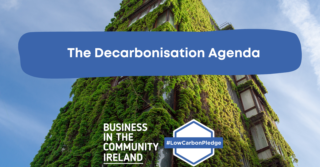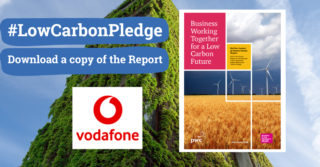Reducing the company’s carbon footprint with PwC
Professional services firms can play a key role in the fight against climate change due to their global reach and
potential to influence businesses in all sectors. PwC recognises this responsibility and has made significant progress towards a sustainable future for its clients and the societies within which it operates.
PwC has been working on sustainability for many years with a focus on how their direct and indirect actions can help solve some of the most important challenges of our time. The initial approach allowed each territory firm to set their own sustainability targets. As an example of this approach, PwC Ireland has made good progress in reducing its carbon footprint and by 2018 had halved their scope 1 and 2 emissions. While this approach was bearing fruit it was felt that more could be done and that by taking stronger action at a global level PwC could have a greater impact. The global firm made commitments in October 2020 to reduce total carbon emissions (including scope 3) by 50% by 2030 while also reaching net-zero by this point through the application of appropriate carbon offsets. The firm also committed to signing up to Science Based Target initiative (SBTi). At a global level, the firm outlined the required reporting approach and set guidance on possible approaches to achieving net-zero. Each territory must now submit a detailed plan, with supporting data, which shows how the targets will be achieved. This approach allows different territories to chart different pathways which take account of local specifics such as availability of renewable electricity in that area.
The first step involved measuring the full carbon footprint and defining the required yearly reductions per category out to 2030. This trajectory is more challenging as the business has an underlying growth strategy which makes the carbon targets even more challenging. Scope 1 and 2 reductions are driven by procurement of renewable electricity and gas.
The evolution of business travel
As a global professional services firm, business travel is the most significant contributor to the firm’s carbon footprint. It is also the most challenging to address. In order to track emissions related to travel within Ireland, PwC found that data collections had to be enhanced to accurately capture and report on the associated emissions. While road and rail related emissions are material, a range of initiatives linked to electric vehicle use plus greater use of digital tools to enable remote working are anticipated to significantly reduce the related carbon footprint. The more significant element of business travel emissions relates to air travel with intercontinental business travel being the most challenging subset.
PwC’s business air travel can be broken down across three key areas: client meetings, PwC
network events, and specialist staff training. The COVID-19 pandemic has forced businesses to totally reimagine the way they operate and a range of digital collaboration tools have been deployed within PwC which allow for virtual teams to work productively without ever meeting face-to-face. However PwC does anticipate that face to face meetings will still be required, but these will much less frequent and when they do take place more thought will be put into maximising their impact. As an example, a physical meeting which used to happen every 6 weeks with a specific client in California is now replaced with shorter weekly catch up video calls to track project progress. Physical meetings now take place twice a year with a number of sessions organised over consecutive days which focus on longer term planning.
Professional services firms can play a key role in the fight against climate change due to their global reach and
potential to influence businesses in all sectors. PwC recognises this responsibility and has made significant progress towards a sustainable future for its clients and the societies within which it operates. PwC is looking to focus on the social, collaborative and networking aspects of in person meetings. This philosophy of maximising digital technologies while getting more from less’ when flights and physical meetings are required are anticipated to allow PwC to reduce emissions associated with business travel by 50% by 2030 while also managing to grow their business. PwC also noted an interesting perspective on how the increasing focus on sustainability is having a ‘virtuous circle’ effect. As PwC looks to reduce it’s business travel emissions it has found that many clients are similarly looking to achieve their own net-zero commitments. The clients on this path are therefore also incentivised to make sure that their suppliers reduce the carbon footprint associated with the provision of services. This ‘push and pull’ creates even greater pressure to reduce emissions.
PwC has also committed to being carbon neutral by 1st July 2021, which will require availing of appropriate carbon offsets. PwC notes that this is in addition to, and not in place of, SBTi aligned net-zero trajectories. These offsets are seen as appropriate interim measures where technical solutions to enable net-zero in particular sectors are not currently available. An example of this is air travel. While short hop electric flights and carbon neutral synthetic fuel powered long haul flights are anticipated they are many years away from commercial deployment. PwC has employed rigorous assessment methodologies to ensure that any selected offset is truly additional and furthermore aligns with PwC’s specific sustainability goals. It points out that ‘not all offsets are equal’ and careful attention must be paid to both the selection, and the ongoing application of the offset strategy. PwC has a stated purpose to ‘build trust in society and solve important problems’ and they believe that climate change represents the pre-eminent challenge of our day. Having charted a clear path to net-zero, PwC is working closely with its clients to help them on their own net-zero journeys through the provision of a range of services including strategy, business transformation, non financial reporting and assurance.
Download a copy of the full Low Carbon Pledge report.
Find out more about the Low Carbon Pledge.







